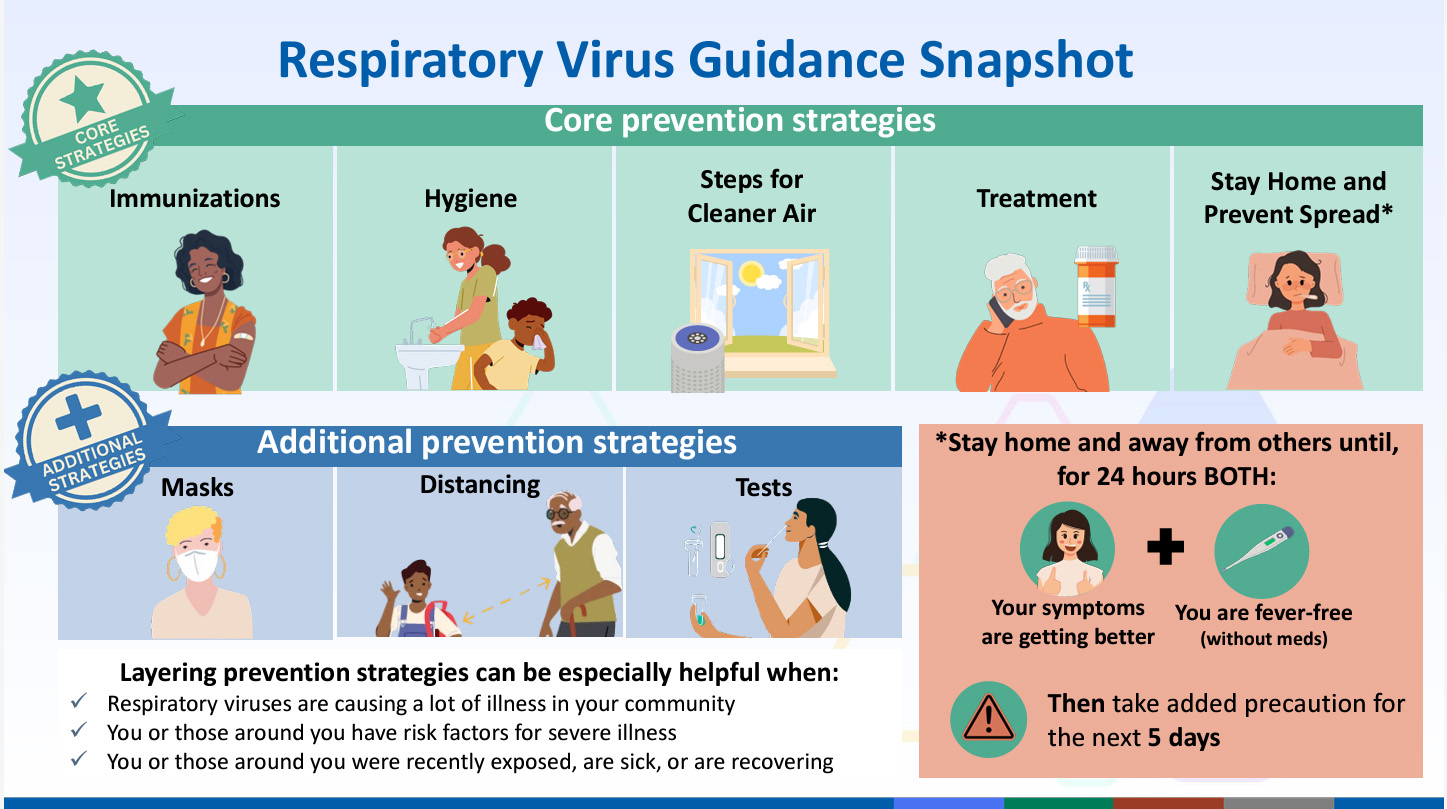Respiratory Infection Policies
As the SARS-CoV-2 virus evolves, the School of Medicine & Health Sciences continues to monitor the status of viral respiratory infections in the U.S.
See this SMHS policy for scheduling and/or hosting events during the pandemic:
CDC Respiratory Virus Guidance
The CDC issues guidelines for the prevention and management of respiratory virus infections. These guidelines provide the organization's latest recommendations for respiratory illnesses, including COVID, RSV, and influenza.
Students completing clinical and fieldwork experiences must follow respiratory virus policies and procedures determined by the clinical/fieldwork site.
- Stay up to date with immunizations.
- Practice good hygiene (practices that improve cleanliness).
- Take steps for cleaner air.
- If you may have a respiratory virus:
- Use precautions to prevent spread.
- Seek health care promptly for testing and/or treatment if you have risk factors for severe illness; treatment may help lower your risk of severe illness.
- Stay home for 24 hours after symptoms start waning AND you are fever-free without medication. Wear a mask and use distancing for 5 days when returning to regular activities.
 Image courtesy U.S. Centers for Disease Control & Prevention
Image courtesy U.S. Centers for Disease Control & Prevention
UND Guidelines
UND's Respiratory Virus Recommendations
Event scheduling: To host an SMHS-related event, whether on campus or virtually, follow this procedure, which takes you to the UND Safety Office event process.
UND SMHS Pandemic Guidelines
SMHS Guidance for Signs/Symptoms of Illness
The UND SMHS is dedicated to the health and safety of all students, faculty, staff, and patients. The UND SMHS uses reasonable methods to balance the needs of an individual affected by illness while addressing the goals of safety, confidentiality, and health for the individual; and considers the health of others with whom the individual may come in contact.
Students, staff, and faculty with symptoms of illness should contact their primary care provider for guidance.
Students with a physical or health impairment that may impact participation in education by themselves, fellow students, staff, faculty or patients are referred to SMHS Policy 3.7 Health Conditions Impacting Student Participation for All SMHS Students. Students are to inform their department chair and the program director, the associate dean for student affairs and admissions, or their immediate supervisor of a physical or health impairment that may impact their participation or adversely impact others. Students completing clinical rotations/fieldwork experiences should follow the direction of the clinical/fieldwork site (i.e. employee health).
SMHS COVID Response
Project ECHO: COVID-19
Update and Infection Prevention and Control Methods
- Presenter: Paul Carson, M.D.
- Login required. Contact Julie Reiten for assistance.
Project ECHO: COVID-19
Provider Well-Being During COVID-19
- Presenter: Andrew McLean, M.D.
- Login required. Contact Julie Reiten for assistance.
Resources for faculty who are teaching online:
- Going Online in a Hurry (Chronicle of Higher Education)
- Basic Teaching Strategies and Their Online Translations
- Instructional Design
- Teaching & Learning Resource Repository
Contact the UND Teaching, Transformation and Development Academy (TTaDA) for assistance with:
Information Resources has compiled a variety of Remote Access options to help faculty, staff and students during this time. Information Resources can also help with questions regarding Mediasite and Sharepoint.
Library Resources has compiled a research guide with information pertinent to COVID-19. This page includes information about the ways in which librarians can supplement your online courses, as well as links to information made free by a variety of scholarly publishers and information to help keep you healthy as you transition to a new work environment.
Do you have a question? Ask a Librarian!
Consistent with University guidance for University staff, Program Directors will inform residents and fellows about their expectations in the event that residents and fellows experience illness including:
- If residents/fellows feel sick, they should notify their immediate supervisor and Program Director and go home.
- Residents/Fellows should not try to “tough it out” and continue working if feeling ill.
- Instead of taking leave, the preference is for residents/fellows to work from home such as studying for an in-service exam or board certification, research, etc.; however, work from home is at the discretion of the Program Director and resident/fellow.
Questions or concerns should be referred to Kim Becker.
For anyone who is interested, Dr. Andrew McLean, chair of the Department of Psychiatry and Behavioral Science, adapted a presentation called Resilience.
Updated 3/19/2024